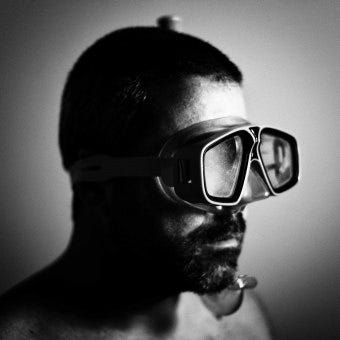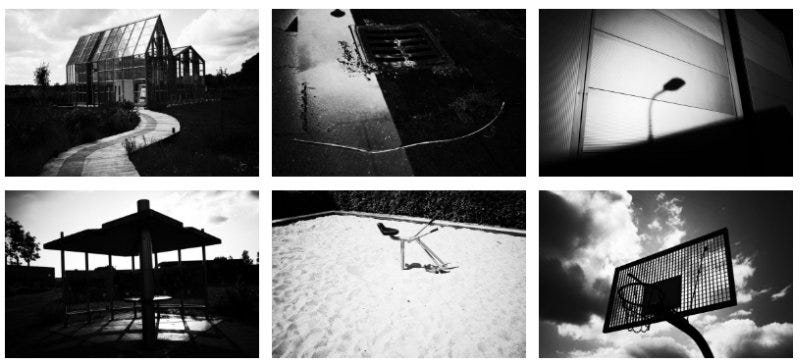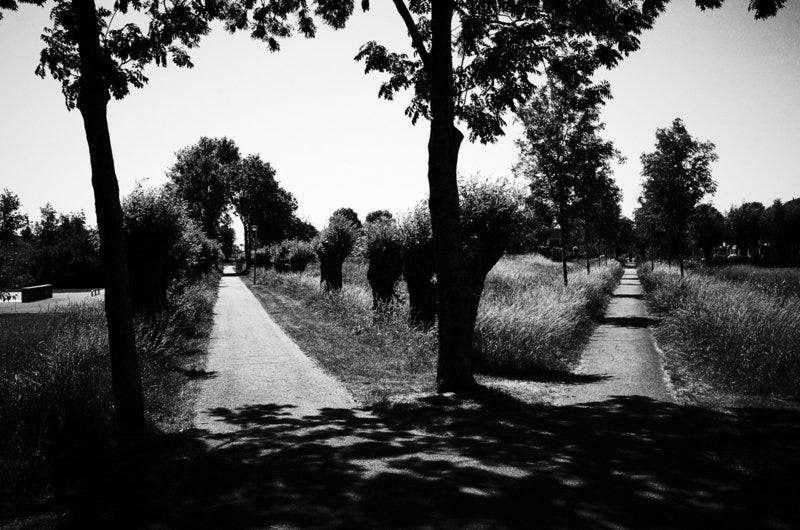The Dark Rooms of... Marcel Borgstijn
The Dark Rooms of... is an interview series in which a photographer talks about his or her darkrooms, the digital and the mental, or technical and inspirational. What makes you click?
In this first edition, I'm kicking things off myself. I already have a long list of photographers I'd like to invite into this series, but am certainly open to suggestions you guys come up with.
Here we go
Who are you?
I am Marcel Borgstijn (1971), living in Culemborg and an enthusiastic autonomous photographer. I deliberately don't say amateur photographer because I don't find that important at all and has a negative connotation. This is not to say that I photograph on a professional level, don't get me wrong. That is also not the reason I photograph. I do it to enjoy myself and if others feel the same way, that is fine, not a necessity. In daily life I work for a large ecommerce company as a Business Analyst. My free time is mostly filled with photography, whether I am taking photos myself, thinking about it or studying books and portfolios. I am married and have two sons, who are regularly the subject of photo projects. One of my recent projects with my youngest son yielded a selection for Photo National 2020. Incredibly proud.
Technical
Do you think technique is important?
Technical, hmmm, a necessary evil shall we say. Not my favorite subject, although it certainly belongs there. After all, you have to understand technology a little to be able to take pictures. A little, because with today's cameras, anyone can take a technically successful picture. That does not interest me at all. My photos that I am most proud of all have a technical shortcoming. What matters to me is the expressiveness of the image, not the technical perfection.
What equipment do you use?
In terms of cameras, I have a Canon 70d that I've barely taken pictures with recently, and a Ricoh GRII, my standard camera so to speak. I almost always have this one with me. The advantage is the compact size so the camera even fits in your pocket. The Ricoh has a fixed focal length of 28mm (converted to full-frame) so you have to be very deliberate in your composition. With the Canon I have the following Canon lenses: 50mm, 100mm Macro, 24-105mm and a Tamron of 70-400mm. Also another lens from Diana+, the plastic Lomography camera that creates a dreamy atmosphere. Have even been thinking of selling everything but the Ricoh this year.
And what software?
In terms of software, I still have older versions of Photoshop (6) and Lightroom (6) that I never use. For several years now I have been managing and editing my photos in On1 PhotoRAW, and great program that can compete with Lightroom. For the things I do with my photos in terms of editing, this is way too comprehensive. Other than some standard editing - like you did in the darkroom - I don't tweak my photos that much.
How do you edit your photos?
I said it already, few startling edits. Vividness, contrast, sometimes a crop if there are distracting elements in the photo, although I try to pay close attention to this when taking them. Straightening if I shot out of hand. And, of course, converting to black and white. In a recent project, I already set that conversion in the camera itself. I was then shooting for 10 months without any editing. What I shoot is what you get.
Inspirational
Where lies your heart?
I fortunately don't do this professionally, so I am completely autonomous in what I shoot. I just go my own way and try to get the images I came up with in my head in front of my lens. I've shot (group) portraits several times but can't say I'm getting energy from doing so. If people know that you like photography, they are likely to ask you to shoot a reportage of a company party or other events. No thanks, call someone else.
Do you have your own style?
I think so, although for me that is not a goal in itself. Because I mainly shoot in black and white with high contrast and I always pay attention to the composition and my photos are never very crowded, I often hear people say that that must be one of my photos. Nice but not that important right? I think it is more important if viewers see or feel what I want to show with the photo. Everyone may and will see their own `something' in it, depending on their personal filters and that is good. That is why I always welcome comments. I like to hear how others experience the image, because I can learn from that myself.
Where do you get your inspiration from?
My inspiration comes from everywhere. Usual suspects like Social Media (although I regularly stop doing that for several months), photographers, photo books. But definitely also from other sources like movies, books and song lyrics. For example, I have created an archive of interesting song lyrics that I would like to do a series on someday. I also find it interesting to look for matching, accompanying music to a presentation. Lately I have started to look at film directors with different eyes. How do they shoot a film, what angles do they use, and how do they ensure that a certain atmosphere is created in the scenes through color. There are very good videos on YouTube (another inexhaustible source of inspiration) that cover cinematography. Super educational. And when I take walks, I often listen after a podcast. Have a number of photographers I subscribed to, and when there's an interesting conversation, I'll often take a closer look at the interviewee. Knowing someone's story allows you to look at their work with a different perspective.
Does your project start with an idea or with a loose image?
Pooh, usually with an idea. That arises in whatever way and forms over a period of time into a more solid concept. Usually I try to know more about the chosen subject as soon as possible, so I can also determine the direction in how I want to carry out the project. Once you know what your feeling or idea is with that subject, you can also represent it more easily. It just doesn't always work that way. I started my current project as a search for why I photograph. I started with a very small set of "rules". I wanted to limit myself as little as possible and after a while analyze what kind of images I had made at this point. I liked that so much that I have been working on it for 10 months now and in the meantime a lot of nice initiatives and alternative selections have emerged.
However, there are also projects that started from one photo and grew from there into a series.
When is your project finished?
That is usually determined by time. For example, if you are working on a mentorship, there is a certain end date when you present a series. So you work toward that over a number of months. With my own projects, I usually have an end in mind. Sometimes that's easy because you're doing a 365-day project, for example, and sometimes because you're suddenly done with your project. Suddenly you can start to dislike it and find no motivation anymore. Immediately stop then!
During your project, do you already know how it ends?
The form usually does. I prefer to work in series and go for a series of 5. That is pretty much the standard within the Dutch Photo Federation, but I also experiment with larger series. For admission to BMK (BondsMeesterKlasse) you have to have a series of at least 12 images. This in itself provides a different interpretation of your images. I also recently joined the RPS (Royal Photography Society) where you work in panels of 15 images, in three rows of five images. And completely different take on putting a series together, but all the more educative to use these different starting points interchangeably. Some projects where I made a few more images also lend themselves well to making a booklet of them. I also enjoy doing that. Finally, lately I have been making mini-zines, small photo books that I print, fold and/or staple myself.
What is your favorite photo and why?
My favorite photograph still varies a bit. Every year you develop yourself as a photographer. That includes images that - at that moment - belong to your best work. And sometimes there are images from years ago that have lost none of their power of expression. Right now, my favorite image is a photo I took in April 2020. A photograph from my Descended Silence project where you can see a split in a walking path. Very coincidentally, this is called the Borgstijn Trail. Turns out my family used to have a piece of land here. In that split you can see the choice we often have to make as humans. Do we go left or do we go right. On the left is a path in sunlight, coming out to a tunnel with light at the end (hmmmm) and on the right the path goes through some dark periods but the trees yield. If you look closely you can see another person walking on the right. This meaning was given to me by someone only later and then the photo came to life for me even more. For this "story," I found it an intriguing image which at first glance appears to be an edit with mirroring. Just shows that storytelling is possible even with one image. Even unconsciously.
Future
What do you want to achieve
First and foremost, I want to enjoy working with images and make pictures I am satisfied with myself. Recognition from others, although caressing, is never the goal. I now have a number of people who give feedback on my work, which I really appreciate and which I can really build on. That is very valuable. Not the likes and the "nice picture" but the really well-reasoned comments. Rather tell me what you don't like and why than circling around and trying to protect me.
I have the occasional project ideas that I still want to work on, but at the moment I mostly lack time. The advantage is that those ideas will take much more shape over time. That should result in more feasible projects, right?
What would you like to know from others? You may ask one photographer one question. What would that be?
I would like to hear what ways well-known photographers have when they are in a creative slump. If photography provides bread on the table, there is obviously more pressure to perform. Where do they get their inspiration and how do they deal with lack of inspiration? Who would I ask? To my idol Anton Corbijn for sure.
Where can we see more
I have a personal website where I have my portfolio: www.borgstijn.nl and in terms of writing about photography obviously this blog. I was also very active on Instagram (@marcelborgstijn) where I also opened separate accounts for some projects. Last year I stopped posting on Social Media channels. It took me too much time and I hardly got any satisfaction out of it. Better to keep everything in your own hands and show your work through your own website. I also posted some projects on my YouTube channel. YouTube channel sounds serious but is nothing more than a video representation of a project. Furthermore, https://borgstijn.nl/linktree is linked to all the places where my work can be seen.
NOTE:
Marcel is featured in the first issue of Darkrooms Magazine with his project Victor. You can read the magazine here:
Do you like this interview? Do you want to see more? Send my some suggestions for photographers you like to see interviewed at Darkrooms. Of course you can suggest yourself if you have an interesting story to tell.







